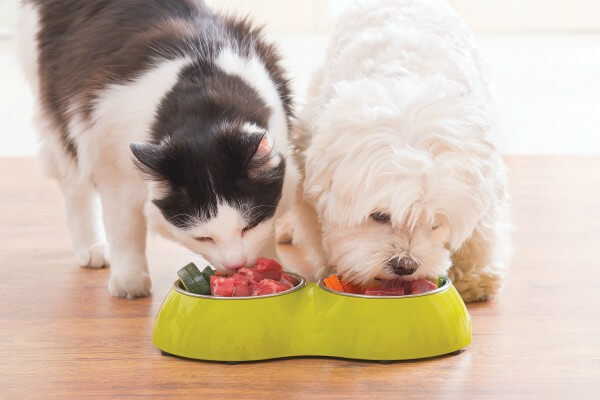The Raw Food Debate

Feeding cats and dogs raw food is on the rise – but are you putting your family at risk?
Over the last few years the number of people feeding their pets raw food has risen significantly, with freezer sections full of raw meat, bones and organs springing up in most supermarkets.
Known as the BARF diet, which stands for ‘bones and raw food’, it’s claimed that it’s more like the food animals would have eaten years ago in the wild, and that it therefore has significant health benefits over processed, cooked food.
However, not everyone agrees. In 2018, Dutch scientists discovered that a high percentage of the raw meat they tested contained food poisoning bugs, including E. coli, listeria and salmonella. Many also contained parasites such as Toxoplasma, which can cause significant harm to babies.
Any raw meat you buy has a risk of containing these, but most bugs are killed in the cooking process. By feeding your pets raw food, there is a risk that the bugs can be passed on to you and your family.
Now, though, there is even more reason to be worried, thanks to a recent discovery – because more than 40 cats nationwide have been diagnosed with TB, which has been traced back to one source of raw food.
‘The truth is, our pets are very, very far from being the wild animals they once were when they would have eaten raw meat like this,’ says Patrick Dale from Springwell Vets in Tring. ‘They’re domesticated animals now, and their needs are very different.
‘For a long time I’ve been wary about the risks of feeding pets raw food. I rarely see any difference in the health of a pet fed a raw food diet and one that’s fed a conventional diet – and at the same time there are risks of contracting salmonella or E. coli. But with this new risk, it’s all become a lot more serious.
‘TB is a serious infectious disease. One cat who contracts it can pass it easily on to any other pets in the house. But, more worryingly, it can also be passed on to humans – particularly the elderly and young children who are more vulnerable.’
In fact this is so serious, Patrick says, that legal proceedings are likely to be carried out against the pet food company involved.
And while those in favour continue to maintain that raw food is perfectly safe if handled properly, Patrick believes it’s too dangerous to dismiss.
‘I would never feed raw, and the veterinary profession as a whole does not justify raw feeding,’ he says.
Danielle Gunn-Moore from the University of Edinburgh agrees. ‘I’m not against the concept of raw feeding per se – it could lead to environmental enrichment for the pet. But it would have to be proven to be nutritionally sound and guaranteed to be free from infectious diseases. While the first has been achieved by some pet food manufacturers, we don’t know how the latter can be achieved, and that’s what concerns me as now we are seeing cases of bovine TB infection in Britain.’
We mentioned in our printed magazine that more information came to light as we went to press. That information comes in the form of a detailed fact sheet for owners and veterinarians which you can read or download here.
